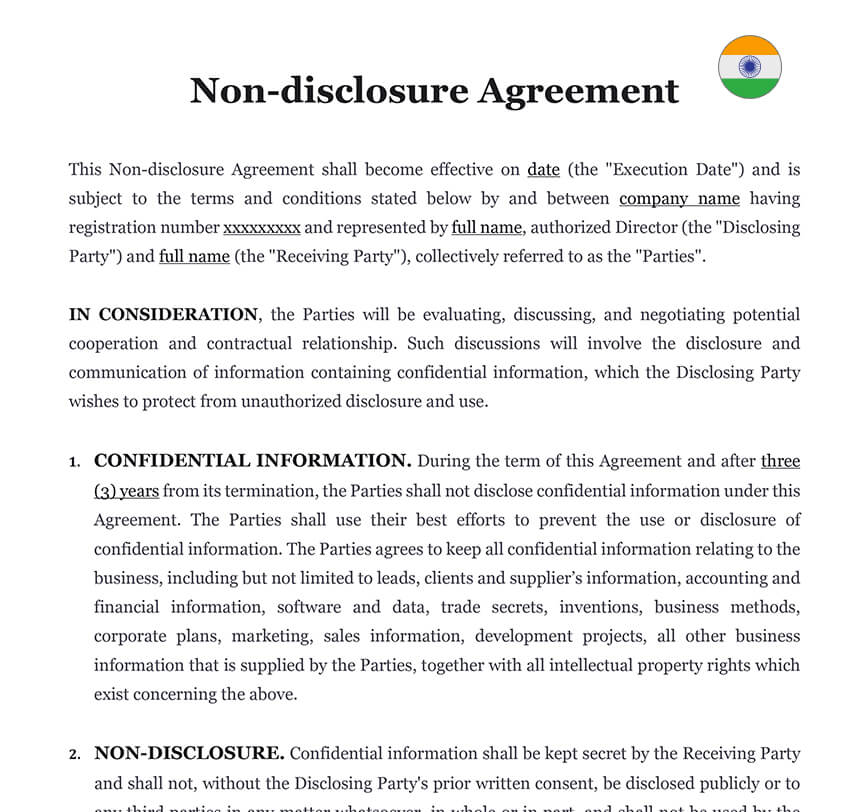
Download this Non-disclosure Agreement (NDA) to protect the confidentiality of business information from disclosure by the other party.

Word Document (.docx)

Ready to use legal template
Drafted by experienced lawyers
Compliant with Indian law
Ready to use legal template
Drafted by lawyers
Compliant with Indian law
A Non-disclosure agreement (NDA) is an essential tool to protect your company’s contracts, trade secrets and intellectual property. They prevent people from disclosing private information and potentially profiting from it at the expense of others. It is therefore necessary to have collaborators, employees, partners and other stakeholders who can obtain vital information about your company and its activity sign the agreement. In fact, once signed, the agreement allows you to control and secure the dissemination of certain key information. The effectiveness of an agreement depends directly on the quality of its drafting, the nature of the commitments and the quid pro quo it provides. Themis Partner’s non-disclosure agreement template will allow you to effectively protect your company.
A Non-disclosure agreement or confidentiality agreement is a contract between two entities that commits one of these entities to keep confidential certain information that the other will be required to communicate to it. The agreement can also be “mutual”, i.e. both entities agree not to disseminate certain information exchanged.
A non-disclosure agreement allows, for example, a company to disclose secret information to a partner while ensuring that this information will not be disclosed publicly or to a competitor. This partner can then offer products that are compatible with those of the supplier while preserving the intellectual property or the industrial part of the components.
More and more often, confidentiality clauses are used between industrial partners to ensure the protection of an invention that is not protected by a patent; in fact, the public disclosure of an invention does not meet the criterion of novelty necessary to obtain a patent. In addition, an industrialist who does not wish to take out a patent can use these agreements to preserve the confidentiality of his know-how, and thus avoid incurring the registration costs associated with a patent. On the other hand, some criticize these agreements for their uselessness and warn against their abusive use. It is therefore necessary to think whether the object or discovery can be protected, an idea cannot be patented or protected.
Non-disclosure agreements are often used by inventors who are trying to maintain confidentiality before formally protecting their rights with a patent application. A public disclosure of a patentable concept may require the inventor to relinquish his or her patent rights. The NDA prevents such a situation until the inventor is able to file a patent application.
In addition, a company may require new employees to sign non-disclosure agreements as a condition of employment to protect confidential business information. For example, a restaurant may require employees to sign a non-disclosure agreement before disclosing award-winning recipes to cooks. Confidentiality agreements are commonly used at the beginning of a joint venture or other business arrangement where both parties are likely to exchange confidential information.
Confidentiality agreements are usually established between partners to maximize collaboration. Both parties disclose information that, if leaked, could harm their business. Whether you own a small business or run a department in a large corporation, confidentiality agreements and non-disclosure agreements are critical to protecting your organization’s sensitive or proprietary information.